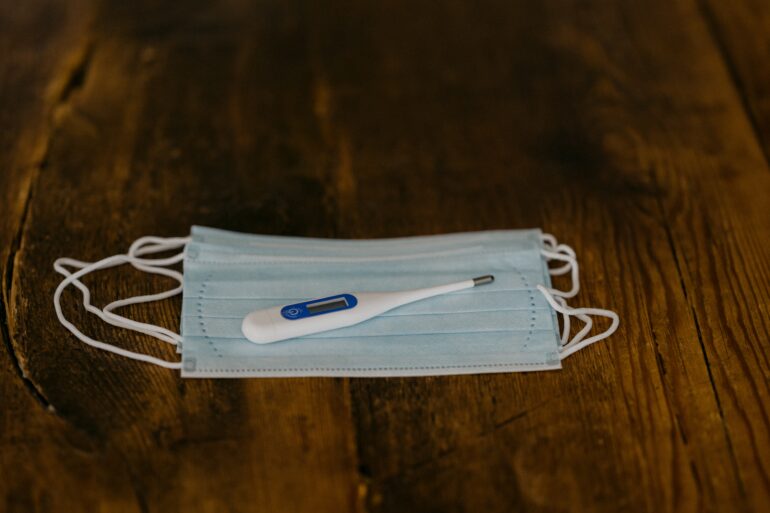By now, most of us are aware of the coronavirus symptoms and how it spreads from person-to-person, but there is little information out there on what it actually feels like to have the virus. For the (many) lucky ones who survive it, some report feeling like they had a bad cold, allergies or no symptoms at all, while others say it was the worst two weeks of their lives. They report terrible chills, being constantly winded, horrible lung pain, headaches and a hacking cough that won’t let up. So we wondered—what does it really feel like to have coronavirus? Here are five personal experiences shared on social media recently, that shed some light on the virus that is threatening us all, and why we should be taking self-isolating very seriously.
The below first-person accounts were shared publicly on social media and with other media outlets.
Michael Bane, Chicago, IL
“It’s brutal, and I have no doubt it can kill you.”
Bane, a husband and father, shared his powerful story of battling COVID-19 to show others who were saying it’s just a bad cold how brutal the virus really is.
“I’m a 42-year-old male who is relatively healthy. I exercise regularly, and generally avoid being ill,” he wrote. Bane believes he contracted the virus while visiting his wife at work at Rush University Medical Center. His symptoms included a very high fever, extremely painful body aches that kept him from sleep, profuse sweating, feeling like his skin was on fire at times and frequent coughing fits. When he did feel better, he found that he just got worse – showing that often the virus does make some think they are recovering before it really hits. His Facebook post is a long read, but extremely eye opening to the timeline of how the virus affects a seemingly health person, and the hurdles he encountered in being tested and eventually admitted, which most likely saved his life.
Bane told CBS Chicago‘s Suzanne Le Mignot that he is improving, but cannot be released from the hospital until his fevers go down and he needs to stay hydrated. “If you have loved ones, you don’t want to get this,” he told Le Mignot over video, “You’ve got to take it seriously, because we’re not all going to survive. It’s real, and it’s brutal.”
Justin Wilhite, Rancho Cordova, CA
“Don’t sleep on this thing people”
I have it. Don’t sleep on this thing people. I’m a very healthy type I diabetic. My body is fighting it very well but it’s kicking my ass. Don’t be a moron. Stay home! pic.twitter.com/X0Lb2FYE6z
— Justin (@jwdaddy80) March 17, 2020
Wilhite, who is currently recovering, is sharing his experience with coronavirus on Twitter, often doing live Q&As so he can help as many people as possible realize that the virus, and all precautions in place, need to be taken seriously. On March 22 he wrote, “Word of the day is FATIGUE! That’s the prevalent deal right now. Headache is still around, lung pain is subsiding, and breathing is painless, FINALLY!”
Wilhite told ABC 10 in Sacramento that “he went to the Emergency Room after passing out and having difficulty breathing, but medical staff treated him for the flu, unaware that he was carrying coronavirus. However, he was simply not recovering, despite flu medication that doctors gave him and soon returned to the ER.” It was later confirmed that Wilhite did have coronavirus. “Don’t think chest pain like a heart attack or flu,” he said. “This isn’t the flu. We all pretty much know the flu. Think deeper, think lung pain.”
One unique aspect to note about Wilhite’s experience, is that he did not have a fever, a major indicator in the list of COVID-19 symptoms. This really proves that every case is unique.
Amy Brock, Summit County, Ohio
“I am the face of this infection. It is brutal and I’m a healthy 48-year-old with no underlying conditions.”
Brock woke in the middle of the night and her heart was racing, “I had trouble catching my breath and my chest felt tight every time I coughed,” she wrote. She had a high temperature of 102 degrees and contacted a friend who was a nurse, who told her to call the hospital and go in. Once at the ER, and after a series of other tests, she finally tested positive for COVID-19. Her husband had been in Germany the week before, but had no symptoms. “It was so surreal,” she told Buzzfeed news. “I was really sick and I knew something was wrong.”
How is she recovering? “I’m not 100% better but I’m home resting,” she wrote last week on Facebook. “Please take this seriously. People you love, their lives may depend on it.”
Craig Spencer MD MPH, New York City
“You might hear people saying it isn’t bad. It is.”
Our medical professionals are heroes putting their lives on the line to keep our country going. Here’s a look at how an ER doctor who already fought on the front lines of one crisis makes it through a day in this one. A good reminder for us to help them out by staying home. https://t.co/ah7vva9776
— Barack Obama (@BarackObama) March 24, 2020
Dr. Craig Spencer, director of global health in emergency medicine at Columbia University’s Irving Medical Center and New York Presbyterian Hospital does not have coronavirus, but his account of a day in the ER is something everyone needs to read. He is one of the hundreds of thousands on the front lines, risking their life to help COVID-19 patients. From a doctor’s perspective, Dr. Spencer notes a range of symptoms for both young and old in his Twitter thread—cough, shortness of breath, fever, vomiting, low blood pressure. He wrote, “Over the past week, we’ve all learned the signs – low oxygen, lymphopenia, elevated D-dimer.”
He writes of patients on life support, needing ventilators with dwindling supplies. “Hospitals are nearing capacity. We are running out of ventilators. Ambulance sirens don’t stop,” he said. “Everyone we see today was infected a week ago, or more. The numbers will undoubtedly skyrocket overnight, as they have every night the past few days. More will come to the ER. More will be stat notifications. More will be put on a ventilator.”
You might hear people saying it isn’t real. It is.
You might hear people saying it isn’t bad. It is.
You might hear people saying it can’t take you down. It can.
I survived Ebola. I fear #COVIDー19.
Do your part. Stay home. Stay safe.
And every day I’ll come to work for you
— Craig Spencer MD MPH (@Craig_A_Spencer) March 24, 2020
Mark Frilot, Kenner, LA
“Due to the misdiagnosis, we have exposed it to others unknowingly. For that I am truly sorry.”
Heaven Frilot shared on Facebook that her husband Mark was diagnosed with coronavirus — the first case at their local hospital. A private person, she decided to make the post public so more people would take the virus seriously. “Mark has tested positive for the Coronavirus. He was misdiagnosed last weekend and told he had the flu. As of this Thursday he is in EJ ICU with the virus and double pneumonia. He is fully sedated and paralyzed and intubated no longer breathing on his own. He is quarantined so I cannot even be there for him to help him get through this,” she wrote on Facebook.
Frilot told The New York Times that Mark was “never, ever sick,” when he came home with a fever, and then his symptoms rapidly worsened. “This could have happened to anyone,” she said. As of March 18, Frilot is still battling the virus and he was expected to be on a ventilator for another week.
We know these first hand accounts can be scary. Please practice social distancing, good hygiene and stay home. If you feel like you may have COVID-19 symptoms, call your doctor and do not leave your house.
More Coronavirus Coverage:
6 of the Best Apps to Help You Stay in Touch During the Coronavirus Pandemic
Our Elderly and COVID-19: What to Know, What to Do and How to Help At-Risk Seniors During the Coronavirus Outbreak
Coronavirus: What You Need To Know About COVID-19 — Here’s the Latest
 Macaire Douglas lives in the Chicago suburbs with her husband and two sons, and covers the Weekend 101 and monthly Recommended Events features. She proudly supports Save Abandoned Babies Foundation, a Chicago-based nonprofit organization that works tirelessly to prevent the illegal abandonment of newborns nationwide. Since its inception in 2000, more than 3,600 newborns have been safely surrendered and adopted into loving homes.
Macaire Douglas lives in the Chicago suburbs with her husband and two sons, and covers the Weekend 101 and monthly Recommended Events features. She proudly supports Save Abandoned Babies Foundation, a Chicago-based nonprofit organization that works tirelessly to prevent the illegal abandonment of newborns nationwide. Since its inception in 2000, more than 3,600 newborns have been safely surrendered and adopted into loving homes.

